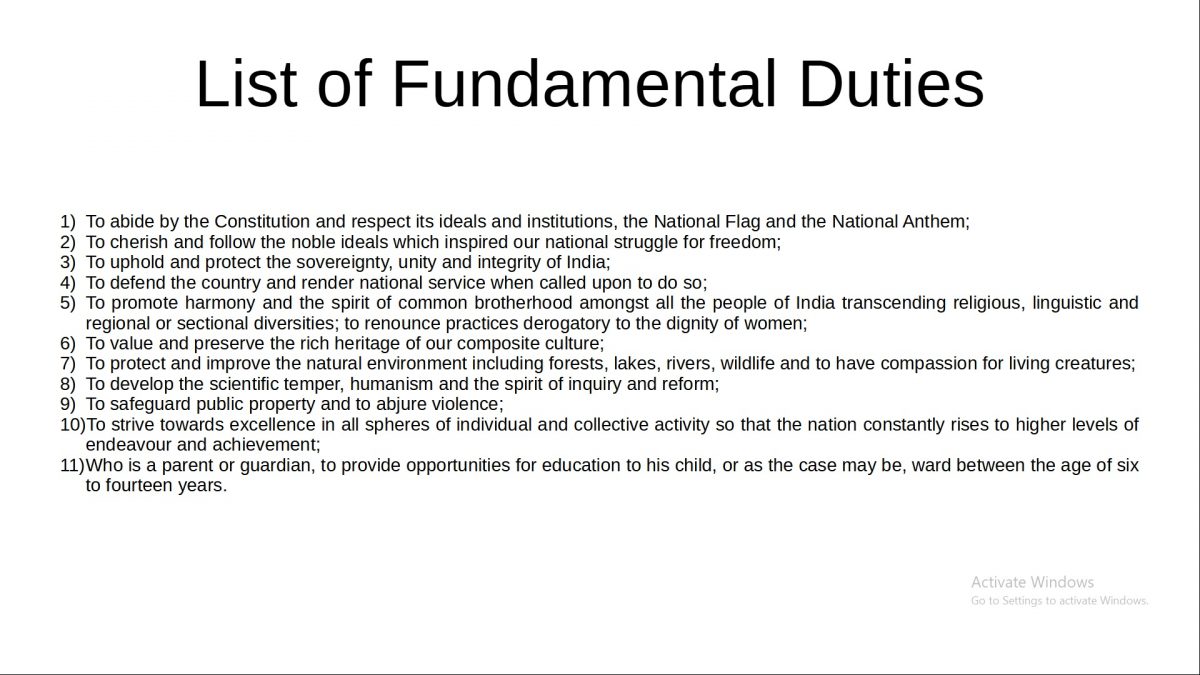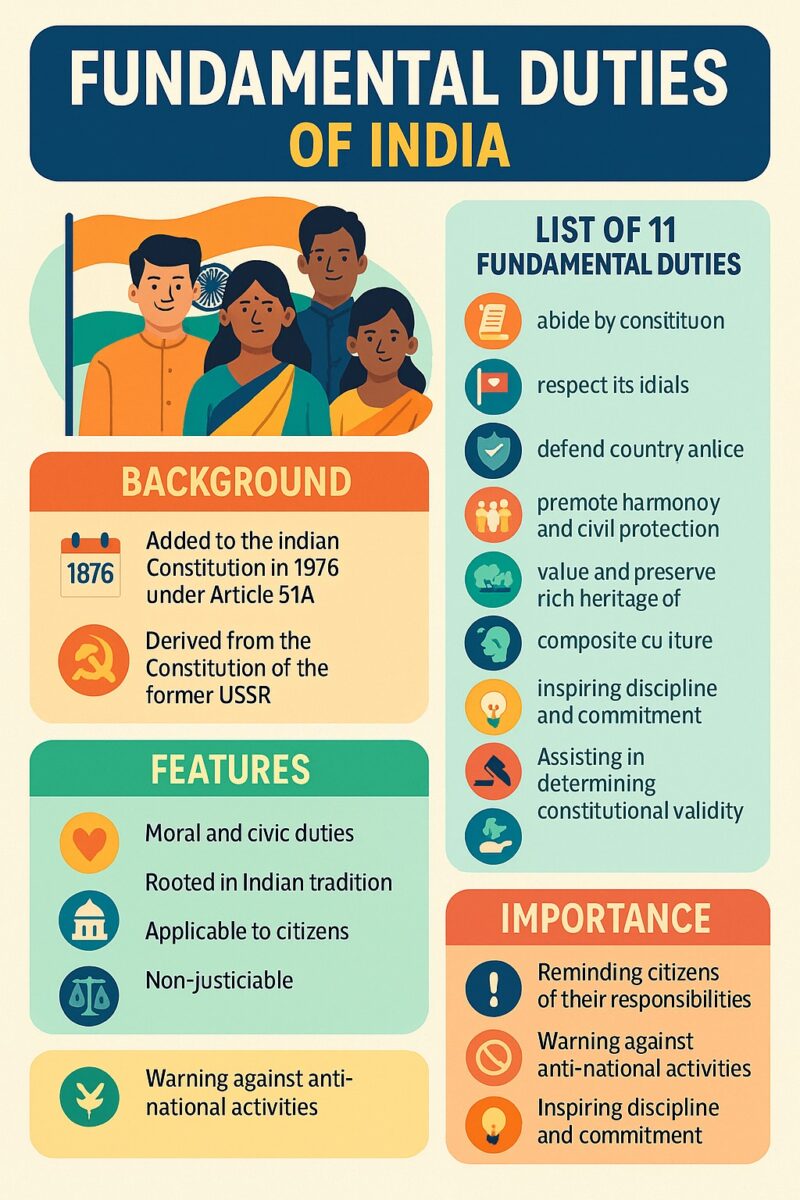Fundamental duties

🇮🇳 Your Role in Nation Building: Understanding India’s Fundamental Duties! 🇮🇳
Just as the Constitution grants you Fundamental Rights (your shield 🛡️), it also outlines Fundamental Duties – think of these as your roadmap 🗺️ to being a responsible and contributing citizen. They are guiding principles that reflect the values needed for a better society and a stronger India.
While Rights tell you what you are entitled to, Duties remind you of your responsibilities towards the nation and fellow citizens.
How Did They Come About? A Quick History Lesson! ⏳
- Original Constitution: Initially, only Fundamental Rights were listed for citizens. Duties were primarily for the State (as Directive Principles).
- The Emergency Era: During the internal emergency (1975-77), the need for citizens’ duties was felt more strongly.
- Swaran Singh Committee (1976): This committee recommended adding a specific chapter on Fundamental Duties.
- 42nd Amendment Act (1976): Acting on the recommendation, the government added Part IV-A to the Constitution, which included Article 51A outlining 10 Fundamental Duties. Inspiration was drawn from the Constitution of the former USSR.
- One More Added (2002): The 86th Amendment Act added the 11th duty related to education.
Quick Facts: ✨
- Where? Part IV-A of the Constitution.
- Which Article? Article 51A.
- How Many? 11 Fundamental Duties.
- Added When? 10 in 1976, 1 more in 2002.
- Legally Binding? They are non-justiciable (more on this below!).
📜 The 11 Fundamental Duties (Article 51A): Your Checklist! 📜
It shall be the duty of every citizen of India:
- (a) Respect Constitution & Symbols: Abide by the Constitution and respect its ideals, the National Flag 🇮🇳, and the National Anthem.
- (b) Cherish Freedom Ideals: Cherish and follow the noble ideals that inspired India’s freedom struggle.
- (c) Protect Sovereignty & Unity: Uphold and protect the sovereignty, unity, and integrity of India. 🤝
- (d) Defend the Country: Defend the country and perform national service when called upon.
- (e) Promote Harmony & Dignity: Promote harmony and common brotherhood amongst all; renounce practices derogatory to the dignity of women. 👩🤝👨
- (f) Value Heritage: Value and preserve the rich heritage of our composite culture. 🏛️
- (g) Protect Environment: Protect and improve the natural environment (forests, lakes, rivers, wildlife) and have compassion for living creatures. 🌱🐅
- (h) Develop Scientific Temper: Develop scientific temper, humanism, and the spirit of inquiry and reform. 🔬💡
- (i) Safeguard Public Property & Abjure Violence: Safeguard public property and avoid violence. 🚫💥
- (j) Strive for Excellence: Strive towards excellence in all individual and collective activities for national progress. 🏆
- (k) Provide Education Opportunity (Parents/Guardians): Provide opportunities for education to your child/ward between the ages of 6 and 14 years. 📚 (Added in 2002)
Understanding the Features: ⚙️
- Moral & Civic: Some duties are moral calls (like cherishing freedom ideals), while others are civic responsibilities (like respecting the flag).
- Indian Roots: Many duties reflect values long-cherished in Indian traditions and practices.
- Citizens Only: Unlike some Rights, these duties apply specifically to Indian citizens.
- Non-Justiciable: This is important! It means you cannot be taken to court solely for violating a Fundamental Duty. However, this doesn’t make them powerless. Parliament can make laws to enforce these duties indirectly (and many existing laws align with them).

Why Do These Duties Matter? 🤔
- Reminder: They constantly remind you of your responsibilities alongside your rights.
- Warning: They act as a warning against anti-national or destructive activities (like disrespecting the flag or damaging public property).
- Inspiration: They inspire discipline, commitment, and active participation in nation-building.
- Legal Interpretation: Courts sometimes consider Fundamental Duties when deciding if a law is reasonable and constitutionally valid.
Rights ↔️ Duties: The Balancing Act ⚖️
Fundamental Rights and Duties are two sides of the same coin!
- Complementary: They often support each other. Example: The Right to Education (Art 21A) is complemented by the Duty of parents/guardians to provide education (Art 51A(k)).
- Potential Conflict? Sometimes people focus only on Rights (like Free Speech) while ignoring Duties (like promoting harmony). This can lead to problems like spreading hate speech or fake news.
- Strengthening Democracy: A healthy democracy requires citizens to be aware of both their Rights and their Duties and to act responsibly.
Duties in Action (Legal Context): 🏛️
- Supreme Court: The courts have referred to Fundamental Duties in several important judgments, often linking them to environmental protection (M.C. Mehta case), national awards (Balaji Raghavan case), and more.
- Justice Verma Committee (1998): This committee highlighted existing laws that help enforce the spirit of Fundamental Duties, such as:
- Prevention of Insults to National Honour Act, 1971
- Protection of Civil Rights Act, 1955
- Wildlife (Protection) Act, 1972
- Forest (Conservation)1 Act, 1980
In Conclusion:
Even though you can’t be penalised directly under Article 51A for not performing these duties, they are fundamental to our identity as Indian citizens. They represent the values we should strive for and remind us that building a great nation is a shared responsibility! 🤝🇮🇳
